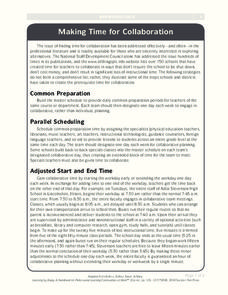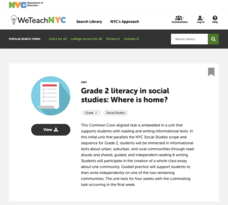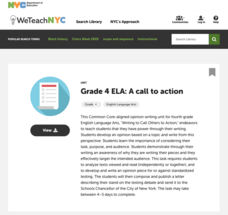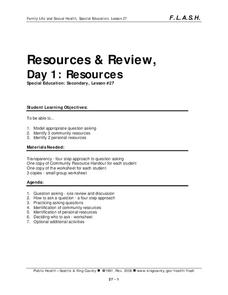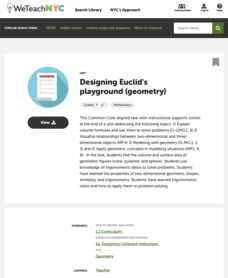All Things PLC
Professional!Learning!Community! Manual: Operationalizing!the!Big!Picture
Thinking of creating a Professional Learning Community at your school? Here's a 32-page manual that provides everything you need to get started.
All Things PLC
A Balanced and Coherent System of Assessment
Assessment is key in any professional learning community (PLC). Check out this graphic that details the types of, frequency of, and purpose of various types of assessments used by PLC teams.
Equality and Human Rights Commission
Learning area 4: Learn About the Meaning of Community
Scholars examine the jobs found in their community by way of surveying. After collecting data, pupils analyze their findings and share their observations with their peers. A video sparks interest. Two posters motivate participants to...
All Things PLC
Making Time for Collaboration
Making time for collaboration, a key element in creating a professional learning community, is a challenge. Not only is the school's master schedule effected, but the schedules of families, community members, and even bus companies, are...
New York City Department of Education
Grade 2 Literacy in Social Studies: Where Is Home?
What makes a community? How communities differ? Young scholars research different types of communities, small rural towns, and large crowded cities. They respond to writing prompts, and write essays in groups to understand the wide...
Pulitzer Center
Peacebuilding: Taking Home Lessons Learned in Africa
Learners take a closer look at one journalist's work on UN Peacebuilding efforts in four African nations: Sierra Leone, Burundi, Central African Republic, and Guinea Bissau. They collaborate to define peacebuilding and discuss...
All Things PLC
Glossary of Key Terms and Concepts
Considering creating a Profession Learning Community at your school? Here's a seven-page glossary of key terms and concepts, everything from action orientation and adaptive to values and vision, that all members should know to...
National Library of Medicine
Your Environment, Your Health: Runoff, Impervious Surfaces, and Smart Development
Can a sidewalk increase the amount of pollution in local streams? Scholars learn the answer to this question though research and experimentation in the fifth unit in the six-part series. Pupils study runoff, impervious surfaces, and the...
University of North Florida
Family Child Care Home Instructional Unit: My Community
As Mister Rogers would say, "It's a beautiful day in this neighborhood," especially when youngsters know all about community helpers and their role in the community. These two units, one designed for ages two to three and the other...
Missouri Department of Elementary
Happy, Sad, Scared and Mad: All Belong To Me
"What are feelings?" and "Why are feelings important to understand?" are the essential questions of a lesson plan that boosts self-awareness. Scholars discuss the four basic emotions—happy, sad, scared, and mad—in...
New York City Department of Education
Grade 4 Literacy in English Language Arts: A Call to Action
You have the power! Scholars learn that they have power of the pen in their writing. After reading and viewing various sources about standardized testing, they express their own opinions about the testing by writing letters to the...
New York City Department of Education
Grade 11 Literacy in Social Studies: Research Paper
The lesson guides young academics through the steps in producing a 10-page research paper on any topic in American history. Historians begin by formulating a thesis and gathering resources, then move on to creating an outline, and end...
King Country
Lesson 27: Resources & Review - Day 1: Resources
To conclude a unit on family life and sexual health (FLASH), class members use the skills they have practiced in previous lessons to develop strategies for getting information or help when they need it.
New York City Department of Education
Peter’s Garden
Watch scholars' understanding of fractions bloom. The resource presents a performance task where the fractions are equal parts from the same whole, and mathematicians must use them to solve problems about a grade level garden. Teachers...
New York City Department of Education
Isabella’s Garden
Create rows and rows of vegetables. Pupils use their knowledge of multiplication to find the number of vegetable shoots planted in a garden and ways to arrange the vegetables in the performance task. Teachers use the suggested unit...
New York City Department of Education
Designing Euclid’s Playground
Create a geometric playground. Pupils work through a performance task to demonstrate their ability to use geometric concepts to solve everyday problems. The accompanying engineering design lessons show teachers how the assessment works...
New York City Department of Education
Grade 5 Literacy in English Language Arts: Should the School Day Be Longer?
Scholars read newspaper articles relating to a longer school day and complete note-taking organizers as they read. They then form opinions and complete outlines before writing essays supporting their point of view.
New York City Department of Education
Grade 5 Literacy: TCRWP Nonfiction Reading and Opinion/Argument Writing
Choose a side! Pupils watch and read several nonfiction resources about zoos. After gathering their research, they choose a side either for or against closing zoos. Scholars complete KWL charts, anticipation guides, flow charts, and...



